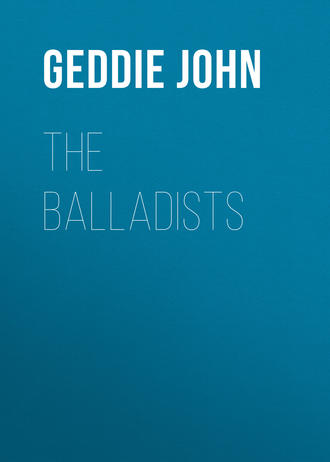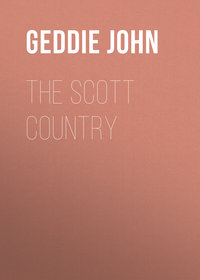 полная версия
полная версияThe Balladists
The Scottish ballads may scarce be so multitudinous and protean a host as this. But the search for them, and the choice of them when discovered, have given infinite exercise to the industry, the judgment, and the patience of successive editors; and literature has no more curious and romantic chapter than that which deals with ballad collecting and collectors. The latter, in Scotland as elsewhere, have not been free from the human liability to err – few men have been less so. As Percy admitted Hardyknut and other examples of the pseudo-antique among his specimens of 'Old Romance Poetry,' Scott's critical acumen did not avail to detect brazen forgeries of Surtees, like Barthram's Dirge and The Death of Featherstonhaugh. In Cromek's Relics of Galloway Song were somewhat palpable 'fakements' of Allan Cunningham; William Motherwell and Peter Buchan made their egregious blunders, and even such careful and experienced antiquaries as Joseph Ritson and David Laing slipped on the dark and broken and intricate paths which they sought to explore. On the whole it can hardly be regretted that our ballad collections bear the impress of the idiosyncrasies of the individual ballad-hunters, as well as of the game they pursued and the district they coursed over.
Scott made his bag, as he tells us, chiefly 'during his early youth,' among 'the shepherds and aged persons in the recesses of the Border mountains,' who 'remembered and repeated the warlike songs of their fathers.' They were gathered on those long pedestrian excursions, with Shortreed or with Leyden (himself a balladist), which were themselves often as full of incident, and of the seeds of future romance, as any old Border raid. The great Master of Romance was, as one of his companions said, 'makin' himsel' a' the time.' Dandie Dinmont, whom the author of Guy Mannering sketches from the traits of a dozen honest yeomen and store farmers, whose hospitality he had shared in his rambles through the wilds of Liddesdale, would a few generations earlier have been a stark moss-trooper, ready to ride to the rescue of Kinmont Willie or to seek his 'beef and kail' in the Merse. The raid on Habbie Elliot of the Heughfoot is but a 'variant' of the lifting of Telfer's kye; and Wandering Willie's Tale, if it had been cast in verse, would have been the pick of our ballads of 'glamourie,' instead of the choicest of short prose stories. The rhyme and air that haunted the memory of Henry Bertram – what are they but an echo out of Scott's own romantic youth – out of the enchanted land of ballad poetry?
'"Are these the Links of Forth," she said,"Or are they the crooks of Dee,Or the bonnie woods o' Warroch-headThat I so fain would see?"'It was on one of these excursions up Ettrick that Scott forgathered with Margaret Laidlaw, the mother of the 'Shepherd,' and the repository of an inexhaustible store of fairy tales, songs and ballads, which, as she declared, the compiler of the Border Minstrelsy 'spoiled' by transmitting to print. But the richest and rarest of his 'finds' was Hogg himself. He was nursed in the lap of the Forest and cradled in ballad and fairy lore. Here was the 'heart of pathos' of the older poetry; the head buzzing with its wild fancies; 'the sang o' the linty amang the broom in the spring'; and along with these the shaggy front, the strong hand-grips, the loyalty, and the sturdy sense that are the far-descended inheritance of the Border farmer and shepherd. Surely, to parody his own words, those who love to listen to Allan Ramsay and Burns and Scott, and to the nameless Balladists who were their masters and teachers, will 'never forget a'thegither the Ettrick Shepherd.'
More important, however, even than the materials gathered by Scott from the lips of Mrs. Hogg and other Border ballad reciters, or from the Glenriddell MSS., was the golden mine of old poetry, for the preservation of which he and the nation were indebted to the taste and retentive memory of Mrs. Brown, daughter of Professor Thomas Gordon, of King's College, Aberdeen, and wife of a minister of Falkland, in the beginning of the century. There are in existence three MSS. of the songs and ballads this lady was able to remember as sung to her on Deeside; and transcription of her father's account of this precious collection, as the story is told by him in a letter to Mr. A. Fraser Tytler, and by him communicated to Scott, may best and most authentically explain its origin: —
'An aunt of my children, Mrs. Farquhar, now dead, who was married to the proprietor of a small estate near the sources of the Dee, in Braemar, a good old woman who spent the best part of her life among flocks and herds, resided in her latter days in the town of Aberdeen. She was possessed of a most tenacious memory, which retained all the songs she had heard from nurses and country-women in that sequestered part of the country. Being maternally fond of my children when young, she had them much about her, and delighted them with her songs and tales of chivalry. My youngest daughter, Mrs. Brown, at Falkland, is blessed with a memory as good as her aunt, and has almost the whole of her songs by heart. In conversation, I mentioned them to your father (William Tytler, the champion of Mary Stuart) at whose request my grandson, Mr. Scott, wrote down a parcel of them as her aunt sung them. Being then a mere novice in music, he added, in the copy, such musical notes as, he supposed, would give your father some notion of the airs, or rather lilts, to which they were sung.'
To all those whose names are mentioned in the above extract, Scotland and poetry owe a deep debt of gratitude. But here again, although men, and men of learning, have borne their part in the salvage, it is to the 'spindle side,' and to simple country ears and memories, that the main acknowledgment is due for saving what it would have been a calamity to lose. What may almost be described as the 'classical text' of some of the finest of our ballads, is that obtained by collation of the Brown 'sets,' of which the fullest is that originally owned by Robert Jamieson, which reappears in revised form in one of the copies possessed by Miss Tytler. From the circumstances of its origin, this text has something of a North Country cast, even where it deals with a South Country theme. But the three divisions of the land, the North, the Centre, and the South, bear a share of the credit of its preservation. The ballads were gathered by Deeside; they were sung and recited under Lomond Law; they were brought before the world by a Borderer.
No such 'finds' are to be looked for any longer. The ground has been for the most part well reaped and gleaned. Only a few ears are to be picked up that have escaped the notice of previous collectors; although, within the last quarter of a century, in quiet corners like the Enzie and Buchan and the Cabrach, the late Dean Christie was still able to gather from the lips of old peasant and fisher women specimens both of ballads and ballad airs that had never been in print. The chief work for half a century has been that of comparing, collating, and critically annotating the materials already found, and reference need only be made to the monumental work in eight volumes of Professor Child, in which the subject of the origins, affinities, variants and genuine text of both the Scottish and English ballads has been thoroughly worked out and brought nearly down to date.
The Ballads themselves have done a greater work. They have permeated and revived the poetry and literature of the century like a draught of rare old wine. The greatest of our modern poets have been proud to acknowledge what they owe to the forgotten minstrels who have not sent down to us out of the darkness, along with their song, so much as their name. Wordsworth, as well as Scott, pored entranced over Percy's Reliques. Coleridge, Tennyson, Browning, Swinburne, and a host besides, have drunk delight and found inspiration in the Scottish ballad minstrelsy; and it has awakened a responsive chord in the lyre of the poets of America. As enthusiastic old Christopher North wrote, 'Perhaps none of us ever wrote verses of any worth who had not been more or less readers of our old ballads.'
'The Bards are lost,The song is saved.'

